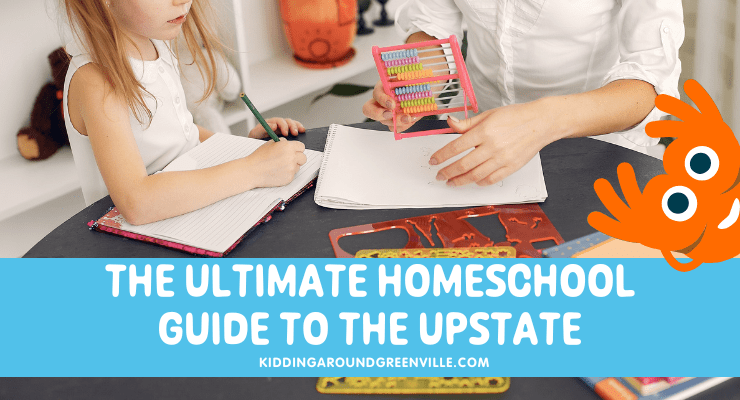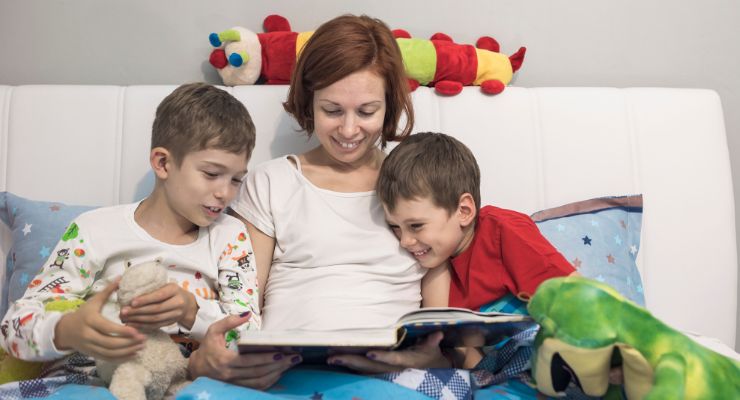Ever wondered how to get kids to talk to parents? Or how to spark meaningful conversations with kids? You love your kids and you want to hear about their day and what’s happening in their lives. But, how do you encourage your kids to talk to you? Try these tips from parents just like you for encouraging kids to communicate and talk to you.
We have all been there (well, at least most of us). It’s the first day of school or our kid goes to camp, and we can’t wait to hear all about it. Then our kid comes home and only provides information in one-syllable answers … “fine.” Or maybe, our kid talks or at least used to, but our life has gotten so busy that we realize we haven’t had a deep conversation with them in days or even weeks.
Talking with our kids is important. In fact, the Palmetto Basics includes talking to your kids as one of the most basic ways to help your child’s brain grow. We also know that talking with our kids and as a family can continue to strengthen relationships and our children’s personal growth as they grow older.
What are some tips then for getting our kids to talk or better to talk to them in a way that invites conversation? We polled our readers to hear what they do to foster family conversations and these are their tips.
Slow Down and Minimize Distractions
For my family, I’ve noticed meaningful discussions increase naturally when we spend more down time together. Hustle and bustle and “get out of the door right now” time doesn’t work. So, family game nights, dinner together at the table as often as possible, taking a walk or even just killing time in between activities by splitting a sandwich or a candy bar at the grocery store. When we create the environment and the space for conversations, they happen.
Maria B.My immediate thought is to set the phone down, turn off the TV, and just actively listen to your kids when you’re with them. It’s amazing the things I notice my kids share or ask about when I am really paying attention.I have also found that reading alongside one another can set the scene for good discussions. My 8-year old will often ask questions about what he is reading or what I am reading and it sometimes turns into something really special.
India M.- Eating dinner together
- Inviting our kids to join us while we work whether making dinner or cleaning
- Reading together
- Even watching TV together can be active if you talk about what you are watching or bond around a show
- Family game nights
- Putting down our phones or turning off the TV when our kids are talking
Take Advantage of Time in the Car
Remember carline and pickups are great opportunities to check in and make them talk.
Liz B.We have had our best/most productive 1 on 1 conversations on car rides- to/from school and road trips.
Ashley B. K.Have Daily Conversational Starters or Prompts
At dinner, we’re at a table without screens and all share something we’re thankful for, usually leads to great convos. Also, use table topics cards sometimes. Other big opportunity for us is tuck in time. All my kids are ‘big kids’ now but each love their 1-1 time in their room and their agenda.
Susannah B.We use everyday conversation as meaningful discussion starters like “do you know where that saying comes from?” ” Why do you think someone would say/do that?” etc.
Jennifer G.We do “Best Part/Worst Part of your day” every night before we say our prayers. The kids always have the craziest stories to tell about the best and worst parts of their days. It usually leads them to tell me about other things on their minds they wouldn’t have thought to tell me about otherwise.
Kelly R.- Table Topic Cards
- Ask your kids for a “Thumbs Up” and “Thumbs Down” moment from the day during dinner or at bedtime.
- Ask your kids what they are thankful for
- Ask your kids meaningful follow-up questions
Incorporate One on One Time Into Your Family Routine
Bedtime really works with my family. Each kid gets individual mom time after everyone has said goodnight. I don’t do it every single night but often enough that they will ask to talk at night when they need it. We just lay next to each other sometimes laughing, sometimes reading and when they need to, they open up about what is on their mind.
Sara W.“Bedtime really works with my family. Each kid gets individual mom time after everyone has said goodnight. I don’t do it every single night but often enough that they will ask to talk at night when they need it. We just lay next to each other sometimes laughing, sometimes reading and when they need to, they open up about what is on their mind.” -Sara W.
Start with a warm loving Wake up and follow thru the morning routines. Pray and onto the school route … Conversation of how’d you sleep to what are we gonna do today after school is a must for us. I pray it always sets the mood for my child’s day
Brandy K.M.Every night at bedtime my kiddos get 15 minutes 1×1 time with me before reading and sleep. They can choose any activity within certain guidelines (can be cleaned in 5 minutes) and it allows us time in their safe space without any distractions to really unwind and get that last stress off before sleep or celebrate daily wins.
Danielle B.Utilize Technology
My kids are entering their teen years and while we make lots of time to have in-person conversations, I’ve found that also texting my kids or sending them a silly meme is another way to communicate that I’m there for them and love them.
Give Your Kids a Safe Space to Share
Every day when we get home we all 3 go on the back porch and discuss our day, good and bad. Everything is open for discussion. At supper time it’s a no phone rule, we eat and do not answer phone calls or texts, so we are spending that time together also.
Victoria R.I believe it’s important to give kids space to choose how much they want to share or talk. Sometimes we can be too eager to get information rather than giving our kids the space to choose what they want to share. Sometimes just allowing silence after a short answer will give our kids the space to then decide to share more.
It’s also important to listen and not to react forcibly to what our kids tell us. Sometimes they may tell us something that worries us but it’s important to guard our reactions so that they know that they are safe to share anything with us.
What tips do you have for having meaningful conversations with your kids?










































